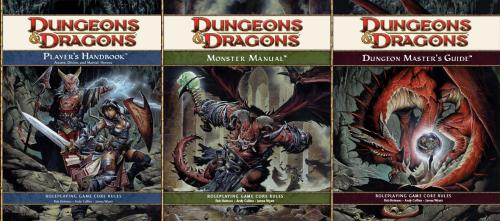You can put me on the list of people that are wary of what the Dungeons & Dragons 4th Edition is going to look like, but admittedly I’m rather middle-of-the-road about it. After 2nd Edition AD&D and the Skills & Powers expansions (which I think of as AD&D 2.5th Edition) had been out for a few years, I was rather burned out on Dungeons & Dragons. I’d done my time playing with power-gaming, rules-lawyering, munchkin half-elven psionicist/ranger dual-classed super-monkeys and spent some quality time playing Call of Cthulhu, 3rd Edition Earthdawn, and some Cyberpunk 2020 every now and then.
When 3rd edition D&D was released, I had my PHB on release day and was pleasantly surprised by a lot of what I saw there. No more explaining ThAC0, saving throws had been rather elegantly simplified, the bonuses received from high attributes (and the penalties imposed by low attributes) were aggregated into a simple progression that made character creation much easier and made the various attributes and classes feel a lot more useful. The Rogue and Cleric in particular looked a lot more effective and fun to play than their AD&D 2nd Edition counterparts. The expandability of the feats and prestige class mechanisms promised a new golden age ushered in by a revolutionary Open Game License. D&D had gone open-source!
Alas, the Open Game revolution has had its casualties. The collective brainpower of every neckbearded basement-dweller in six continents now available for publication, along with the collaborative power and relative anonymity of the Internet, a great many of the little problems with 3rd edition (and its bastard child, D&D v3.5), have ripped into the d20 system like a force of nature, shining light onto every loophole and crevasse. Every 3rd party publication of feats and spells and prestige classes helped fuel a self-sustaining nightmare of min/maxing without the insularity of the local gaming group clustered around a card table in somebody’s mom’s den, without the stern oversight of some central authority with sole rights to the gaming system. D20 had become a monster, a victim of its strengths subverting its weaknesses.
As with any complex system, maintenance is necessary. Future reflection and insight can make obsolete what seems wondrous and inspired today. The 4th Edition Player’s Handbook should be hitting the shelves in May. Unlike 3rd edition, which was published years after I’d abandoned 2nd Edition, I’ll only have jumped ship from D&D for a few months. There won’t be enough time for a jaded nostalgia to set up. The joys and sorrows of my last Iron Kingdoms d20 game will still be relatively fresh, undimmed by the passage of time.
The Wizards of the Coast have been doing a pretty good job of ratcheting up the hype, with developers blogging steadily about whatever their NDAs and managers will allow them to leak, and the fine folks at EN World have been kind enough to put together a compilation of publicly-available information about 4th Edition from the mouths (and keyboards) of the people that are actually making it. Give it a read, and draw your own conclusions, brew up your own speculation, and love it or leave it as you please. I fully expect to buy the core rule set, I just don’t expect to be chomping at the bit as May draws near.
